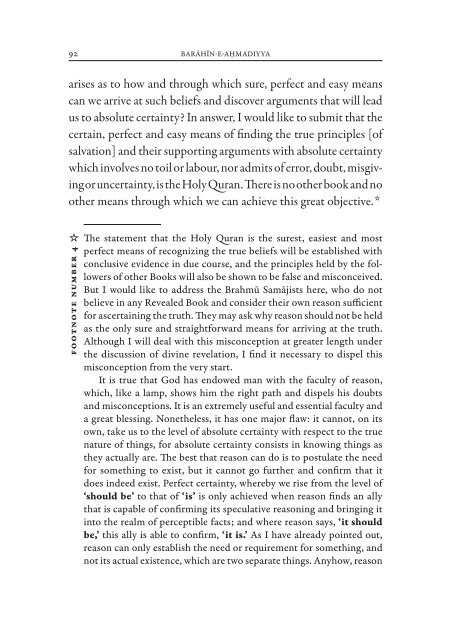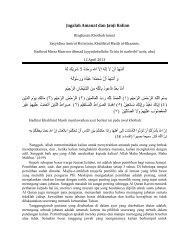You also want an ePaper? Increase the reach of your titles
YUMPU automatically turns print PDFs into web optimized ePapers that Google loves.
92 <strong>Barahin</strong>-e-ahmadiyya<br />
arises as to how and through which sure, perfect and easy means<br />
can we arrive at such beliefs and discover arguments that will lead<br />
us to absolute certainty? In answer, I would like to submit that the<br />
certain, perfect and easy means of finding the true principles [of<br />
salvation] and their supporting arguments with absolute certainty<br />
which involves no toil or labour, nor admits of error, doubt, misgiving<br />
or uncertainty, is the Holy Quran. There is no other book and no<br />
other means through which we can achieve this great objective. ☆<br />
☆ The statement that the holy Quran is the surest, easiest and most<br />
perfect means of recognizing the true beliefs will be established with<br />
conclusive evidence in due course, and the principles held by the followers<br />
of other Books will also be shown to be false and misconceived.<br />
But I would like to address the Brahmu Samajists here, who do not<br />
believe in any revealed Book and consider their own reason sufficient<br />
for ascertaining the truth. They may ask why reason should not be held<br />
as the only sure and straightforward means for arriving at the truth.<br />
Although I will deal with this misconception at greater length under<br />
the discussion of divine revelation, I find it necessary to dispel this<br />
misconception from the very start.<br />
It is true that God has endowed man with the faculty of reason,<br />
which, like a lamp, shows him the right path and dispels his doubts<br />
and misconceptions. It is an extremely useful and essential faculty and<br />
a great blessing. Nonetheless, it has one major flaw: it cannot, on its<br />
own, take us to the level of absolute certainty with respect to the true<br />
nature of things, for absolute certainty consists in knowing things as<br />
they actually are. The best that reason can do is to postulate the need<br />
for something to exist, but it cannot go further and confirm that it<br />
does indeed exist. Perfect certainty, whereby we rise from the level of<br />
‘should be’ to that of ‘is’ is only achieved when reason finds an ally<br />
that is capable of confirming its speculative reasoning and bringing it<br />
into the realm of perceptible facts; and where reason says, ‘it should<br />
be,’ this ally is able to confirm, ‘it is.’ As I have already pointed out,<br />
reason can only establish the need or requirement for something, and<br />
not its actual existence, which are two separate things. Anyhow, reason<br />
Footnote Number 4




